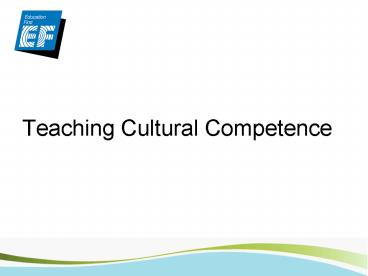Teaching Cultural Competence - PowerPoint PPT Presentation
1 / 22
Title:
Teaching Cultural Competence
Description:
regional cultures. security. institutions. tradition and social change ... Guides to host culture. Destinations and topics. New language. Practice activities ... – PowerPoint PPT presentation
Number of Views:248
Avg rating:3.0/5.0
Title: Teaching Cultural Competence
1
Teaching Cultural Competence
2
Agenda
- Introductions
- What is culture in your classroom?
- Teaching culture and cultures at EF
- What the Common European Framework says
- From theory to practice
- Personal directions
3
Over 400 schools and offices
- English immersion in 8 countries
- UK
- Ireland
- Malta
- USA
- Canada
- Australia
- New Zealand
- South Africa
- English in other environments
- Englishtown.com
- English First
- English First Smart Schools
- English First Kids
- EF Corporate Language Training
- Additional languages taught Spanish, French,
German, Italian, Chinese
ILS London
ILS Cambridge
ILS Boston
4
125 nationalities in our schools
5
Discussion
- How do you define culture?
- What do our students think culture is?
- What is the difference between Culture and
culture? - Culture culture
6
Teaching culture and cultures at EF
7
The Common European Framework
- Beyond language teaching
- Knowledge of the world
- Sociocultural knowledge
- Practical skills social, living, vocational
- Intercultural skills
- Self-knowledge attitude, motivation, values,
believes, cognitive style, personality
8
(No Transcript)
9
Living conditions
- living standards (with regional, class and ethnic
variations) - housing conditions
- welfare arrangements
10
Everyday living
- food and drink, meal times, table manners
- public holidays
- working hours and practices
- leisure activities (hobbies, sports, reading
habits, media)
11
Interpersonal relations
- relations of power and solidarity
- relations between classes
- relations between sexes (gender, intimacy)
- family structures and relations
- relations between generations
- relations in work situations
- relations between public and police, officials,
etc. - race and community relations
- relations among political and religious groups
12
Values, beliefs and attitudes
- social class
- occupational groups (academic, management, public
service, skilled and manual - workforces)
- wealth (income and inherited)
- regional cultures
- security
- institutions
- tradition and social change
- history, especially iconic historical personages
and events - minorities (ethnic, religious)
- national identity
- foreign countries, states, peoples
- politics
- arts (music, visual arts, literature, drama,
popular music and song) - religion
- humour
13
Body language
- Knowledge of the conventions governing such
behaviour form part of the user/learners
sociocultural competence
14
Social conventions
- punctuality
- presents
- dress
- refreshments, drinks, meals
- behavioural and conversational conventions
- taboos
- length of stay
- leave-taking
15
Ritual behaviour
- religious observances and rites
- birth, marriage, death
- audience and spectator behaviour at public
performances and ceremonies - celebrations, festivals, dances, discos, etc.
16
Intercultural awareness
- Negotiating the relationship from origin to
target community
17
From theory to practice
- How do you get culture in front of students?
- Materials?
- Activities?
- Networking?
- Exchanges?
- Host families?
18
Culture Files
- Guides to host culture
- Destinations and topics
- New language
- Practice activities
- Personal reflections
- Diary and sketchbook
- Contact list
- Developed by teachers
19
Culture Files
- Guides to host culture
- Destinations and topics
- New language
- Practice activities
- Personal reflections
- Diary and sketchbook
- Contact list
- Developed by teachers
20
(No Transcript)
21
Englishman on the Road
- Guest teachers
- Sent from ILS
- Great reviews
- Fun topics
Contact your local EF office to request a guest
teacher.
22
Conclusion
- What is culture in your classroom?
- Teaching culture and cultures at EF
- What the Common European Framework says
- From theory to practice































